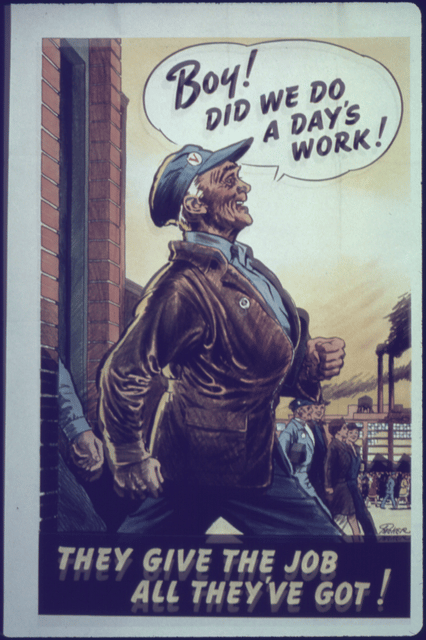Job

Job

A job, employment, work or occupation, is a person's role in society. More specifically, a job is an activity, often regular and often performed in Exchange for payment ("for a living"). Many people have multiple jobs (e.g., parent, homemaker, and employee). A person can begin a job by becoming an employee, volunteering, starting a business, or becoming a parent. The Duration of a Job may range from temporary (e.g., hourly odd jobs) to a lifetime (e.g., judges).
An activity that requires a person's mental or physical effort is work (as in "a day's work"). If a person is trained for a certain type of Job, they may have a profession. Typically, a job would be a subset of someone's career. The two may differ in that one usually retires from their career, versus Resignation or termination
Jobs for people
Most people spend up to forty or more hours each week in paid employment. Some exceptions are children, retirees, and people with disabilities; however, within these groups, many will work part-time, volunteer, or work as a homemaker. From the age of 5 or so, many children's primary role in society (and therefore their 'job') is to learn and study as a student.
Types of jobs
Jobs can be categorized, by the hours per week, into full time or part time. They can be categorized as temporary, odd jobs, seasonal, self-employment, consulting, or contract employment.
Jobs can be categorized as paid or unpaid.
Examples of unpaid jobs include volunteer, homemaker, mentor, student, and sometimes intern.
Jobs can be categorized by the level of experience required: entry level, intern, and co-op.
Some jobs require specific training or an academic degree.
Those without paid full-time employment may be categorized as unemployed or underemployed if they are seeking a full-time paid job.
Moonlighting is the practice of holding an additional job or jobs, often at night, in addition to one's main job, usually to earn extra income. A person who moonlights may have little time left for sleep or leisure activities.
The Office for National Statistics in the United Kingdom lists 27,966 different job titles, within a website published 2015.[1]
Day job
The expression day job is often used for a job one works in order to make ends meet while performing low-paying (or non-paying) work in their preferred vocation. Archetypal examples of this are the woman who works as a waitress (her day job) while she tries to become an actress, and the professional athlete who works as a laborer in the off season because he is currently only able to make the roster of a semi-professional team.
While many people do hold a full-time occupation, "day job" specifically refers to those who hold the position solely to pay living expenses so they can pursue, through low paying entry work, the job they really want (which may also be during the day).
The phrase strongly implies that the day job would be quit, if only the real vocation paid a living wage.
The phrase "don't quit your day job" is a humorous response to a poor or mediocre performance not up to professional caliber.
The phrase implies that the performer is not talented enough in that activity to be able to make a career out of it.
Getting a job
Getting a first job is an important rite of passage in many cultures. The youth may start by doing household work, odd jobs, or working for a family business. In many countries, school children get summer jobs during the longer summer vacation. Students enrolled in higher education can apply for internships or coops to further enhance the probability of securing an entry level job upon graduation.
Résumés summarize a person's education and job experience for potential employers. Employers read job candidate résumés to decide whom to interview for an open position.
Use of the word
Workers often talk of "getting a job", or "having a job".
This conceptual metaphor of a "job" as a possession has led to its use in slogans such as "money for jobs, not bombs". Similar conceptions are that of "land" as a possession (real estate) or intellectual rights as a possession (intellectual property).
Occupation and life expectancy
Historical, manual work has seemed to contribute to shortening one's lifespan.[2] High rank[3] (a higher position at the pecking order) has a positive effect. Professions that cause anxiety have a direct negative impact on health and lifespan.[4] Some data is more complex to interpret due to the various reasons of long life expectancy; thus skilled professionals, employees with secure jobs and low anxiety occupants may live a long life for variant reasons.[5] The more positive characteristics one's job is, the more likely he or she will have a longer lifespan.[6][7] Gender, country,[8] and actual (what statistics reveal, not what people believe) danger are also notable parameters.[9]
See also
International Standard Classification of Occupations
Job analysis
Job interview
Job performance
Job satisfaction
Labor economics
Wage labor